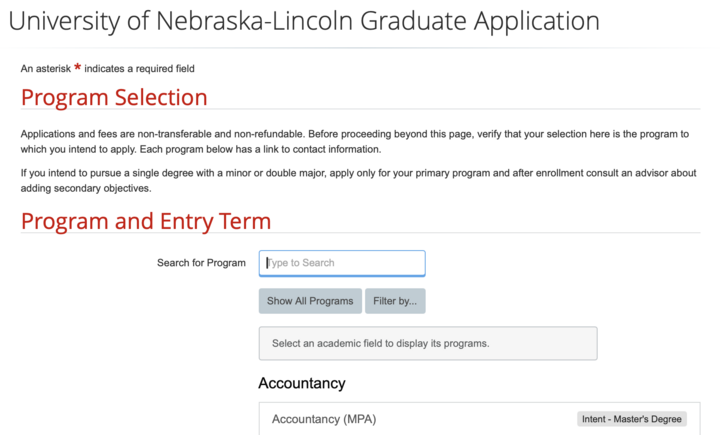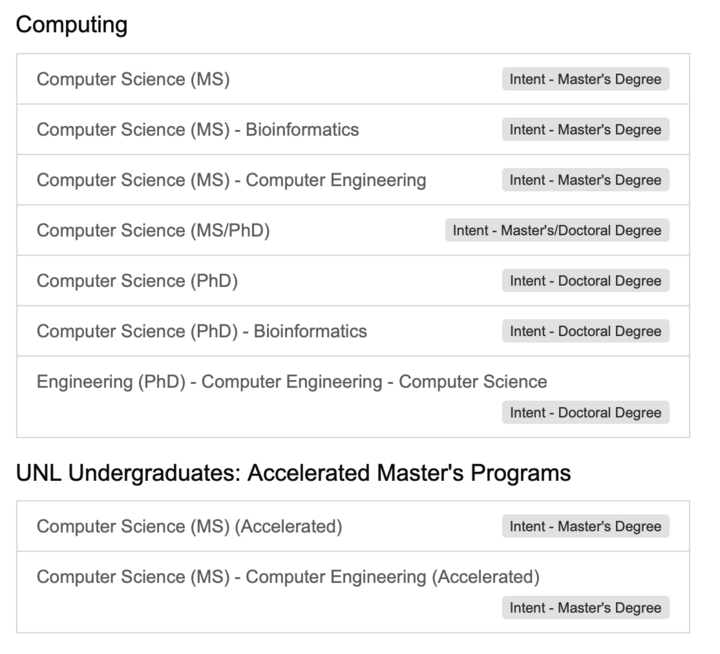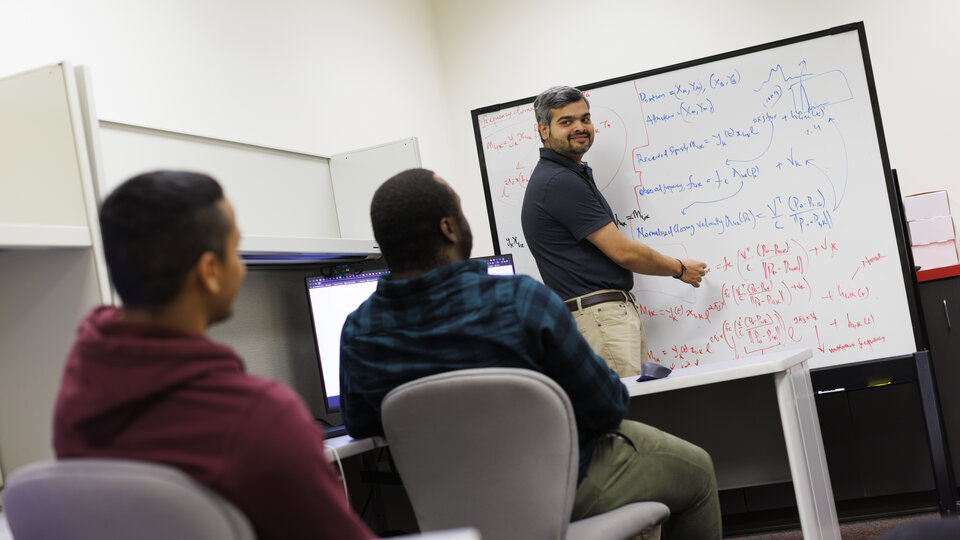The School of Computing has introduced two new graduate certificate programs in Internet of Things and Artificial Intelligence. Explore all our program options below.
Our computer science and computer engineering programs ranked 80th and 71st on U.S. News & World Report’s 2025 Best Graduate Schools List. Read more
Degrees and Programs
Accelerated M.S. Degree Areas
M.S. Degree Areas
Computer Science Computer Engineering Bioinformatics Specialization
Ph.D. Degree Areas
Computer Science Computer Engineering Bioinformatics Specialization
Graduate Level Minor
Graduate Certificate
Application and Admission Information
Deadlines
Application Deadlines | ||
|---|---|---|
Fall Admission | Priority date for financial consideration (Ph.D.) | December 1 |
Priority date for financial consideration (M.S.) | January 15 | |
Last date to apply (both M.S. and Ph.D.) | March 1 | |
Spring Admission | Priority date for financial consideration (Ph.D.) | August 1 |
Priority date for financial consideration (M.S.) | September 1 | |
Last date to apply (both M.S. and Ph.D.) | October 1 | |
For full financial consideration, candidates should apply and submit materials by the priority dates for their respective degrees. Your application will still be considered for financial support based on financial availability if received after the priority dates.
Admission Requirements
M.S. and Ph.D. degree requirements
Admission to the M.S. or Ph.D. programs in computer science or computer engineering in the School of Computing at the University of Nebraska-Lincoln are based on various factors, including but not limited to: the student's areas of interest, the recommendation letters, the student's statement of purpose, and the qualification of the applicant in relation to other qualified applicants.
The minimum graduate admission requirements are:
| Computer Science: | Computer Engineering: |
|---|---|---|
Program | We encourage students without a B.S. or M.S. degree in computer science, computer engineering, software engineering, or a related field to apply to our graduate program. Applicants must demonstrate mastery in the following areas: college-level calculus, college-level fundamentals of computer science, computer organization, discrete mathematics, and data structures and algorithms. If you are missing one or more courses, you may be admitted with provision and take these courses at the University of Nebraska–Lincoln as deficiency courses (not for graduate credit) within a set amount of time after beginning the program. | Applicants with a background in computer engineering, computer science, or electrical engineering, as well as engineering, mathematics, or physical sciences are encouraged to apply for graduate studies in computer engineering. |
Degree | Applicants must have:
| |
Grades and Scores | Applicants must have:
Note: The GRE is not required. | |
English Proficiency | If English is not your native language, you will be required to demonstrate your ability to undertake advanced academic work in an English-speaking institution in one of the following ways:
| |
Graduate certificate requirements
The steps for admission of an applicant into the Graduate Certificate in the Internet of Things program will follow the admission requirements and procedures established by the Office of Graduate Studies. The IoT Advisory Committee will review all applications and make admission decisions. The Advisory Committee will also identify a faculty advisor for each admitted student. This advisor will be responsible for assisting the student in developing a plan of study and will monitor student’s progress, in collaboration with the Advisory Committee and School of Computing Graduate Chair.
Prerequisites/Deficiency Procedures:
In addition to Office of Graduate Studies admission requirements, all students must have:
- A B.S. in engineering, computer science, or a related field
- A GPA of at least 3.0
Specific prerequisites:
- Fundamental knowledge of computer science and engineering, including computer programming, algorithms, and exposure to operating systems and software development.
Additional details about graduate certificate requirements can be found in the university's Graduate Catalog.
Tuition and Funding
Based on competitive funding mechanisms, graduate students can be awarded teaching assistantships, research assistantships, and/or fellowships.
Supported full-time students receive:
- A minimum annual stipend of $24,000,
- A full tuition waiver for up to 12 credit hours, and
- Almost 80% of their student health insurance premium covered.
Assistantships
Teaching Assistantships |
|
Research Assistantships |
|
Frequently Asked Questions
Helpful Information for International Applicants
If you are not a U.S. citizen or you have been educated outside the U.S. you may be asking yourself these questions:
- Is my degree equivalent to a U.S. bachelor's degree?
- Will I have enough money to support myself and my family?
- Am I prepared for graduate coursework taught in English?
- Am I allowing enough time to meet deadlines and to schedule my visa appointment?
- Will I need a form from the university for a visa interview?
- How should I prepare for arriving in the United States?
How to Apply
After reviewing the university's admission requirements, begin your online application. You will provide basic information, including the following materials:
- CV or Resume.
- Statement of Purpose describing your goals and plans for graduate school, your related academic background and research experience, names of faculty with whom you would like to work, if selected, as well as how our graduate programs will help you meet your goals.
- Three references who will be asked to submit letters of recommendation electronically. You will provide contact information for each reference. You will then be able to send your references an email with a secure link and they'll be able to upload their letters. No hard copies are necessary.
Select your preferred School of Computing graduate programs under the heading Computing. See detailed instructions below.
If you need assistance or additional instructions for selecting your degree program or completing your application, you can view more details below.
Graduate Degree Selection During Application
Prospective graduate students begin their application process by selecting a graduate degree program and submitting an application to the University of Nebraska–Lincoln Office of Graduate Studies. The School of Computing offers several master's and doctoral-level graduate degrees, so choosing your desired graduate degree program may be confusing. The instructions and images below will help you select and apply to the correct degree program.
You will select your graduate degree program at the Program Selection step of the application process:

In the Search for Program field, enter the word "computer." The search results should return the graduate degree options available in the School of Computing, except for the graduate certificate. To select the graduate certificate, enter the word "internet."


Select your preferred School of Computing graduate programs under the heading Computing.
Note: The computer engineering graduate degree is also listed here at the bottom as Engineering (PhD) – Computer Engineering – Computer Science.
After you've completed your application, you can check your application status in MyRED.
Research Areas
Software Engineering
| Topics |
|
| Labs | ESQuaReD Lab — The Laboratory for Empirically-based Software Quality Research and Development Lab is an internationally renowned software engineering lab that uses design and verification concepts to solve everyday software engineering problems and create more dependable systems. SERESL Lab — This research of the Software Engineering Research and Empirical Studies Lab (SERESL) involves the construction of techniques, tools, and environments to assist in program comprehension, software evolution, software visualization, and software traceability. |
Informatics and Algorithmic Foundations
| Topics |
|
| Labs | ConSyst Lab — The research at the Constraint Systems Lab encompasses both theoretic and practical aspects of constraint processing, a sub-area of artificial intelligence that provides the right tools to model and solve a wide variety of problems in many areas of computer science. IAMAS Lab — The Intelligent Agents and Multiagent Systems Lab studies foundational and applied research, development, simulation, and agent-based modeling in intelligent agents and multiagent systems. RICE Lab — The Research and Innovation in Computing Education Lab studies computer science education research, including CS courses, computational thinking, broadening participation in computing, and K-12 professional development for teachers. SBBI Lab — The Systems Biology and Biomedical Informatics Lab’s research explores complex biological systems through data analysis, computational modeling, cellular responses to environmental stimuli, and the molecular interaction involved in biological networks. Visualization Lab — The Visualization Lab studies novel solutions to analyze, visualize, and communicate big data at high interactivity and fidelity. This team investigates theories and technologies that ensure the scalability of end-to-end big data analysis and visualization workflow. |
Systems
| Topics |
|
| Labs | CPN Lab — The Cyber-Physical Networking Lab is an international research hub dedicated to the field of next-generation wireless networks. This lab focuses on innovations in wireless networks of systems that are aware of, can timely adapt to, and change their environment. ICE Lab — The ICE Lab works on design, analysis, evaluation, measurement, automated testing, and formal verification of Internet protocols to make the complicated Internet Correct and Efficient. iDEA Lab — Intelligent Device-2–Applications Lab research spans the areas of design and implementation of cross-layer (device, circuit, architecture) co-design for implementing complex machine learning tasks and secure computation, including hardware security, and the security of artificial intelligence. INT Lab — The Intelligent Network sysTem (INT) Laboratory focuses on cutting-edge network system research, including wireless networks, edge computing, autonomous driving, and mobile metaverse. MBiTe Lab — The Molecular and Biochemical Communications Lab applies communication and engineering tools to propagate artificial information in biological and biochemical systems and environments, such as genetically engineered bacteria and the human body to create novel biological computing networks. Netgroup — The Networks Research Group works on broad areas of networking and security research with focus on creating and building efficient, scalable, reliable, secure and cost-effective architectures and systems. NIMBUS Lab — The Nebraska Intelligent MoBile Unmanned Systems Lab is an exciting place where the latest research and technology in software development, systems engineering, robotics, and sensor networks converge to develop more capable and dependable UAVs. SWAN Lab — Security, Wireless & Ad hoc Networks (SWAN) Lab research focuses on network security and privacy with applications to emerging wireless networks, cyber-physical systems, Internet-of-things, aviation and transportation networks, and the interaction between cybersecurity and social networks. |
Research and Faculty
When it comes to research and innovation, we consistently achieve a level of excellence unparalleled by most. Our groundbreaking, globally renowned research has continually led to industry-evolving innovations. Interdisciplinary research is integral to our culture.
Explore Research Labs and Opportunities
Your can also check out our faculty research video series that gives you an inside look at the groundbreaking projects being conducted in our school.


